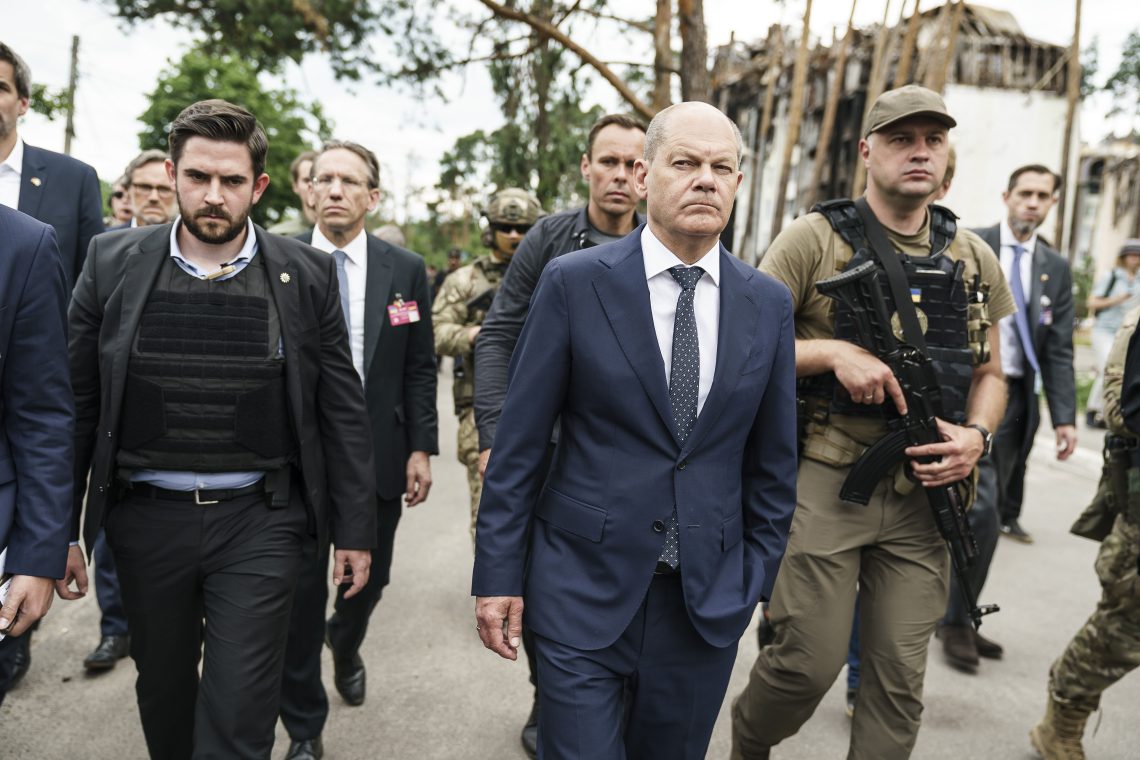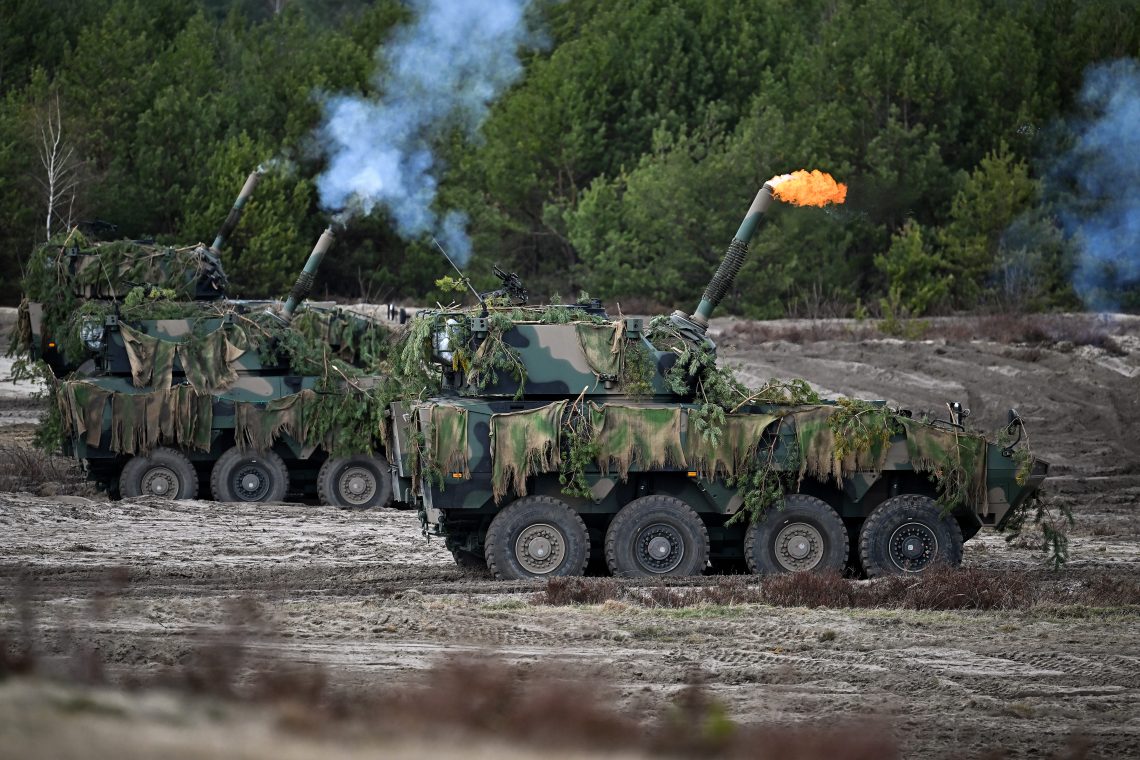Contours of a postwar Europe take shape
The outcome of Russia’s war in Ukraine will shift power dynamics within Europe, and could shake up the long-standing Franco-German axis.

In a nutshell
- The war in Ukraine has put Germany’s status on the line
- Success for Kyiv would move Europe’s center of gravity east
- A protracted stalemate will intensify divisions within the EU
No matter how or when the war in Ukraine ends, one thing is already clear: the European political scene is set to fundamentally transform. Most immediately, a long-standing focus on commerce and the projection of soft power will be replaced by an emphasis on hard security.
Across the continent, governments are scrambling to make strong commitments to military rearmament. This process will see a substantial degree of consensus and cooperation, boosting the standing and purpose of NATO. In contrast, what promises to be deeply divisive is that future relations within Europe will be shaped by how different countries have faced up to the challenge of supporting Ukraine. Germany provides a powerful illustration.
End of an era
While Europe was focused on commerce and development, the brute strength of the German economy guaranteed it would have a leading role as the engine of growth and ultimate arbiter of economic policy. During her 16 years as Germany’s chancellor, Angela Merkel assumed a role as the leader of the continent, always ready to maneuver to safeguard the European Union.
When Russia launched its full-scale invasion of Ukraine, the roof caved in. The shock not only highlighted the fallacy of decades of German Ostpolitik, based on a firm belief in Wandel durch Handel, or change via trade. It also brought an end to 16 years of Ms. Merkel promoting a steadily increasing role for Russia as a provider of energy, most notably via the controversial Nord Stream pipelines.
Led by President Frank-Walter Steinmeier, Germany’s political leadership has engaged in public soul searching. Given that all of its senior figures had been so deeply involved in dealing with Russia, hiding behind a mantra of “we were all wrong” was a convenient way to avoid individual accountability.
When Chancellor Olaf Scholz spoke of a Zeitenwende, the end of an era, his flagship proposal was a 100 billion-euro wager on military defense, envisioning a role as the strongest military power on the continent. But even if the government does take up this effort, the current state of the Bundeswehr is so sorry that it will be a long time until Germany can assume any meaningful role as a security provider. The switch from soft to hard power will thus undercut Germany’s role and standing in European affairs.
That said, promising to rearm was the easy part. As other governments developed programs to provide military support for Ukraine, Chancellor Scholz embarked on a plan of evasion, involving endless excuses as to why Berlin is not able to deliver heavy weapons. Ignoring mounting criticism, both in domestic media and from foreign sources, the government has persisted in refusal.
An eastward shift
Looking beyond the cessation of hostilities, two distinct scenarios are possible. One envisions victory for Ukraine, with Russian forces ousted and Moscow forced to accept defeat. The other is a stalemate, in which Ukraine is provided with sufficient military assistance to liberate some territory newly occupied by Russia but not enough to press further.
The former is the scenario favored not only by Ukrainian President Volodymyr Zelenskiy, and the overwhelming majority of his people, but also by those who have provided Kyiv with substantial military aid — above all the United Kingdom and the United States, as well as Finland, the three Baltic states and three of the four Visegrad members (excluding Hungary).
Also noteworthy is that the main actors in Brussels, including European Commission President Ursula von der Leyen, President of the European Council Charles Michel, and EU foreign policy chief Josep Borrell have all been quite deliberate in their use of the catchphrase “victory for Ukraine,” which Chancellor Scholz has studiously avoided.
A victorious Ukraine would emerge with the most powerful and battle-hardened military force on the continent.
Whether the full liberation of Ukrainian territory – including Crimea – is at all realistic is not at issue here. The point is that political battle lines are now being drawn that will shape the postwar allocation of credit (if it ends well) and of blame (if it ends badly). In this sense, Germany is playing a high-stakes game that may result in a major loss of standing.
This is a key reason why it has been difficult to build a pan-European consensus on how to support Ukraine: the implications of a decisive win for Kyiv would be far-reaching, going well beyond the costs of accepting bans on Russian energy exports.
In the long term, it would mean shifting the center of gravity in Europe toward the east, away from the Franco-German axis. EU membership for Ukraine would seriously undermine French aspirations for a European leadership role. A new security order that includes Ukraine would shine an unforgiving light on the underwhelming state of the German Bundeswehr, while a massive program of postwar economic reconstruction would give important roles in rebuilding to the countries that provided Kyiv with military support.
The most important feature of this scenario is that it would effectively solve the thorny problem of security guarantees for Ukraine. Maintaining sanctions on Russia until the issues of reparations and culpability for war crimes have been settled will prevent Russian armament industries from rebuilding. At the same time, providing NATO-standard heavy weapons will ensure that Ukraine can stay well ahead of the curve, for when Russia inevitably does begin restoring its military.

Ukraine would emerge with the most powerful, and easily the most battle-hardened, military force on the continent. Along with an increased U.S. military presence in Poland and in the Baltic republics, Russia would be effectively contained. Fundamentally, the controversial issue of membership for Ukraine in NATO would be defused.
The upshot of having restored territorial integrity and solved the security problem would be to allow reconstruction to begin in earnest. The sums needed are so large that reference to a “Marshall Plan for Ukraine” is apt, but success will hinge not only on foreign donors. The decisive factor will be whether the private sector finds good commercial reason to make major commitments. If that happens, then Ukraine could embark on a path toward becoming a modern, high-tech economy. The proven resilience of its civil society will be a major asset, enabling integration into Europe.
Stalemate
The alternative scenario assumes that Ukraine is forced to accept a cease-fire, in the form of a “Minsk III” agreement allowing Russia to hold on to large parts of captured territory. This could happen via pressure from leading European powers, notably Germany, France and Italy; or simply if military support is kept at a level at which Russian artillery bombardment, using thermite and cluster munitions, can finally exhaust both the will and ability of Ukrainian forces to fight back.
The outcome of this scenario would be a magnified rerun of what followed the Russian invasion in 2014. It would feature Franco-German demands that the status of Donbas and Crimea must be handled as separate issues, and might even allow Russia to hold on to territories conquered during the current war. The latter would clear the way for the Kremlin to proceed with a Crimea-style annexation of the southern coastline of Ukraine, causing the country to become landlocked and dependent on Russia for access to exports via the Black Sea.
The core question of security guarantees would not be possible to resolve. Ukraine has already had sordid experiences of promises broken, ranging from the Budapest Memorandum to the Minsk Agreements. After what has transpired in recent months, Kyiv will convincingly argue that Russia simply cannot be trusted. And, in the absence of credible security guarantees, the Ukrainian economy will stand little chance of serious revival.
If Russia prevails, the roles played by Germany and France will be placed in unforgiving focus.
If Ukraine does win the war, and Russia is forced to accept defeat, then the resentment and recrimination over what happened during the phase of open hostilities may recede. There would, however, still be a shift in the balance of power within Europe: those who played leading roles in defeating Russian aggression would emerge as the lead players, both in the construction of a new security order and in the reconstruction of Ukraine’s economy. This would have important long-term implications both for NATO and for the EU.
In late May, British Prime Minister Boris Johnson suggested including Ukraine in a new “commonwealth” that could also be open to membership for Turkey. Such a proposal suggests the triangle of Poland, Ukraine and Lithuania as a new point of gravity in Europe, backed by the U.S. and the UK. In Finland, meanwhile, it has become common to speak of North Central and Eastern Europe (NCEE). It is a vision that again implies a shift in European power dynamics toward the east – thus reducing the clout of the Franco-German axis.
Postmortem
If, in contrast, Russia should be allowed to win, the respective roles that have been played by Germany and France will be placed in an unforgiving focus. As many German opposition politicians, former ambassadors and media intellectuals have been warning, there is considerable reputational damage at stake. There are two key factors that would be held against those who would be accused of having failed to provide adequate support while there was still time.
One concerns security guarantees. Given a stalemate, Kyiv would not be alone in arguing that it is only a matter of time until Russia feels it has accumulated enough military strength to resume the offensive and finish off the job in Ukraine, after which it could move on to other targets, like Moldova. Gradually lifting sanctions would deepen such fears. Allowing German and French industries to resume business would also allow rebuilding of the Russian military.
The other factor concerns retribution. If matters of war reparations and accountability for war crimes are shunted aside as part of a cease-fire deal, Ukraine will be joined by those across Eastern Europe in moral outrage. Such outrage will be exacerbated by the fact that, during the first 100 days of its war in Ukraine, Russia earned 93 billion euros from unsanctioned fossil fuel exports, much of which was paid by Germany (and Italy).
If Ukraine does get a speedy, substantial boost in deliveries of heavy weapons and ammunition, then it may yet succeed in gaining enough momentum to defeat Russia and bring the war to an end. The outcry over Russian atrocities remains so loud across Western societies that this is still the likely outcome.
However, the longer the war of attrition drags on, the likelier it becomes that supportive Western governments will experience “Ukraine fatigue,” and that Ukrainian troops will be weakened to the point at which Kyiv must accept a cease-fire, with all that follows. In that case, the German government may find itself in for a rough ride, and the EU can expect to be gridlocked by internal recriminations among member states.







